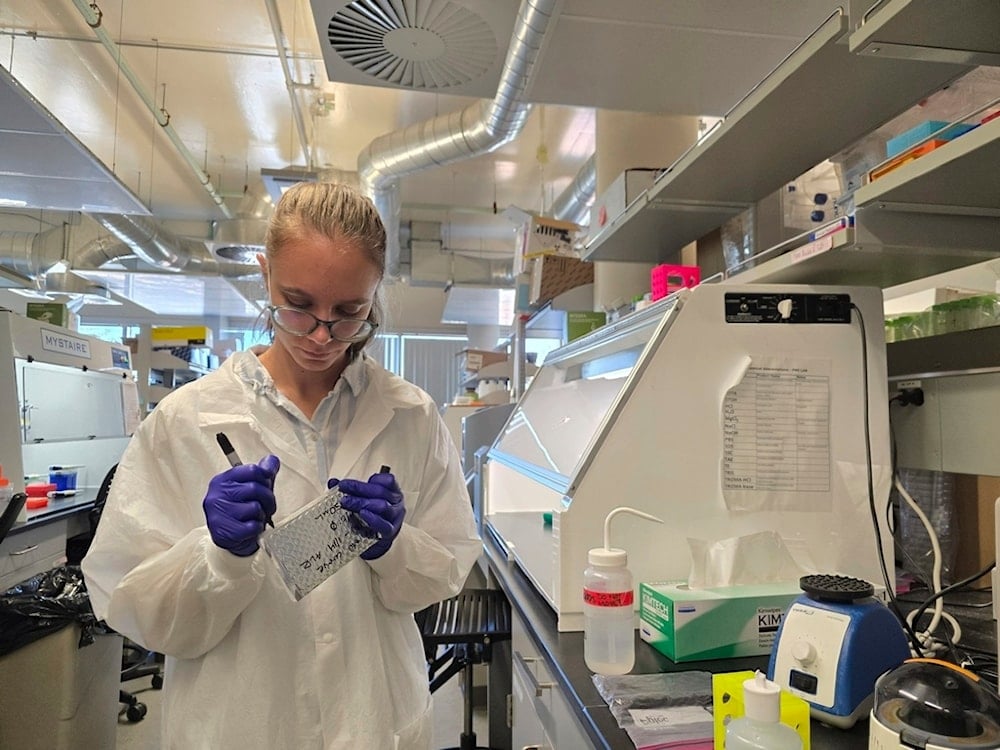New White House website claims COVID-19 caused by 'China lab leak'
The website specifically targets Anthony Fauci, Biden’s former chief medical advisor, accusing him of promoting what it calls “the preferred narrative that Covid-19 originated naturally.”
-

Anna Riley, a microbiology major, labels vials in a lab at Northern Arizona University in Flagstaff, Ariz., Friday, Jan. 31, 2025 (AP)
The White House has launched a new version of its official COVID-19 website, which promotes the theory that the coronavirus originated from a laboratory in China, marking a sharp shift in messaging and a move that is already stirring controversy both at home and abroad.
The revamped Covid.gov site, once primarily focused on vaccines, testing, and public health guidance, now frames the lab-leak theory as the most credible explanation for the pandemic’s origin, describing it as COVID-19's “true origins.”
A prominent full-width image of President Donald Trump leads the homepage, while the site criticizes the pandemic response under former President Joe Biden, including mask mandates and social distancing measures introduced in 2020.
Fauci, natural origin theory targeted
The website specifically targets Anthony Fauci, Biden’s former chief medical advisor, accusing him of promoting what it calls “the preferred narrative that COVID-19 originated naturally.” It argues that “by nearly all measures of science, if there was evidence of a natural origin, it would have already surfaced. But it hasn’t.”
The site outlines five key points aimed at supporting the lab-leak theory, citing the presence of China's top SARS research lab in Wuhan, the location of the first known outbreak, and alleging substandard biosafety protocols.
Once dismissed as a fringe theory, the lab-leak hypothesis has gained mainstream traction in recent years, with US intelligence agencies now offering diverging conclusions. Earlier this year, the CIA revised its position, stating that a lab leak was “more likely” than a natural transmission from animals.
The FBI and Department of Energy have also voiced support for the lab origin theory, though their assessments differ in confidence levels.
China responds
Chinese officials have repeatedly rejected the lab-leak claims, calling them “extremely unlikely.” Beijing has urged the United States to “stop politicizing and instrumentalizing the issue of origin-tracing,” maintaining that it has cooperated with international efforts to investigate the pandemic’s source.
Tensions between Washington and Beijing remain high amid an ongoing trade war, with the US announcing new port fees and increased tariffs on Chinese goods just one day before the website relaunch.
The updated website also includes a section on “COVID-19 misinformation,” accusing past public health officials of suppressing alternative treatments and colluding with social media companies to censor dissenting views—a narrative frequently echoed by conservative commentators in the US.
The Biden administration has denied claims that it attempted to censor opposing opinions on COVID-19 policy.
One striking visual element is an animated map of Wuhan, which pulses rhythmically on the page, drawing attention to the virus’s origin.
US tariffs escalate on China
Previously, Washington had imposed a 145 percent levy on Chinese goods, while Beijing responded with a 125 percent tax on American exports. The new announcement suggests a 100 percent increase in US tariffs, though no formal breakdown has yet been offered to explain how the cumulative 245 percent figure is calculated.
In response, a senior Chinese official criticized the impact of US trade measures, stating they are placing "pressure" on China. Still, Beijing reported stronger-than-expected economic results for the first quarter, including 5.4 percent GDP growth, a 6.5 percent rise in industrial production, and a 4.6 percent boost in retail sales over the past year.
Despite these positive figures, Chinese authorities warned that global economic conditions are becoming "more complex and severe" and emphasized the need for further efforts to bolster domestic consumption and growth.
Foreign Ministry spokesperson Lin Jian condemned Washington's approach, saying, "If the US really wants to resolve the issue through dialogue and negotiation, it should stop blackmailing and talk to China on the basis of equality, respect and mutual benefit."

 4 Min Read
4 Min Read










